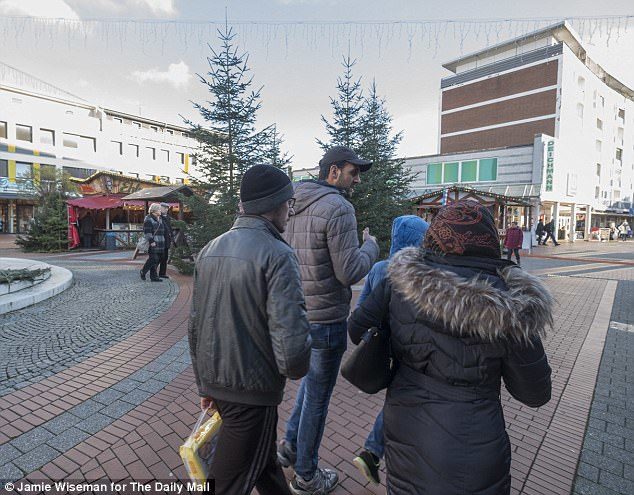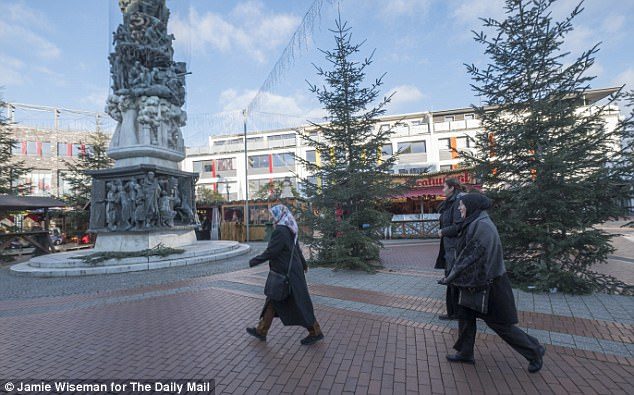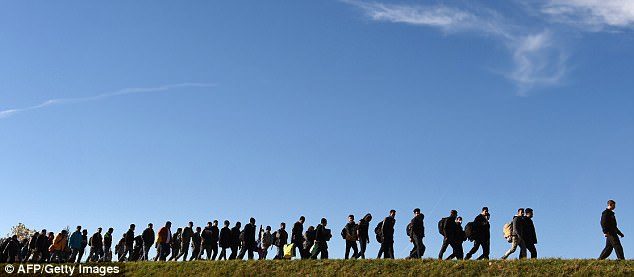In a German town with an unrivalled record of welcoming migrants and making them feel at home, excited children wave from carousel rides as shoppers chattering in German and Arabic mingle.
On the face of it, it's a relaxed scene of which Angela Merkel, the German leader, would surely approve.
Except that here in Salzgitter, things are abruptly changing. It's pro-refugee Mayor has declared a moratorium on any more foreigners coming to join the 5,800 who have already arrived.
He admitted a few weeks ago: 'Right now, we are overwhelmed. We have received too many in too short a time. The locals are having fears for the future.'
Comment: Check out SOTT radio's: The Truth Perspective: Weapons of Mass Migration: Interview with Michael Springmann on Europe's Migrant Crisis
Here in Salzgitter, things are abruptly changing. It's pro-refugee Mayor has declared a moratorium on any more foreigners coming to join the 5,800 who have already arrived.
'Not everyone can come or there will be nowhere to sleep and no free chairs in the schools,' says Khaled Rasti, a 32- year-old Syrian from Damascus, who with his wife Slivi, 30, is wheeling two-year-old Jodi - one of their three children - in a pushchair near the Christmas market.
'We have worries,' he says. 'I am still learning German. I do not have a job. There are many like me.'
This town's decision to refuse any more migrants is a slap in the face for Mrs Merkel, who relentlessly lectured her nation that 'We can do it' when she unilaterally welcomed 1.5 million migrants, many of them Muslim, from the war-shattered Middle East and impoverished African states in 2015.
Today, increasing numbers of ordinary Germans feel the influx has been too large and too fast for the incomers to integrate properly.
Already, six per cent of the German population is Muslim.
And this week an international think tank warned the numbers will only increase, and predicted Europe's Muslim population could double by 2050, due to migration and high birth rates among those who have already reached the continent.
The Pew Research Centre forecast that if both regular migration and the heavy flows of refugees were to continue, this deeply Christian country will have the highest number of Muslims in the EU, amounting to 17.49 million people or 20 per cent of the population.
Even the migrants living in Salzgitter (pictured), which sits on a lake in Lower Saxony, north-west Germany, agree there is a crisis
This uncontrolled immigration is seen as a key factor in the reversal of Angela Merkel's fortunes.
It is directly responsible for the rise of a new anti-migrant party, the radical Right-wing Alternative for Deutschland (AfD), which in September's national election gained 13 per cent of the vote and its first ever parliamentary seats.
Coupled with her own poor performance in the election, the success of the AfD is the reason Mrs Merkel has been unable to form a coalition government.
The irony of all this is that for three decades, in an attempt to expunge the legacy of its Nazi past, Germany has championed multiculturalism and liberal democracy - only to find that its recent openborders immigrat ion policy, introduced without a vote in Germany's parliament, has rekindled the flames of the radical Right.

They believed Mrs Merkel's promise of giving them homes, jobs, an education and money with few questions asked. Now they - as well as many Germans - fear they are not becoming part of the wider society, and never can be because their numbers are so huge.
No place illustrates the shattered Merkel dream better than Salzgitter.
It took in a higher proportion of migrants compared to its population than any other part of Germany.
Ninety-one per cent of those migrants in the town today are jobless and live on benefits, according to new statistics from town officials, compared with a slightly less dismal picture nationally for migrants of 84 per cent.
One of the charities trying to find them work says they are only qualified for the simplest of jobs because of low education.
'We just don't have the jobs that these people could take,' a volunteer explained. But aside from the problems of work and welfare are the sheer numbers who have arrived.
This town's decision to refuse any more migrants is a slap in the face for Mrs Merkel, who relentlessly lectured her nation that 'We can do it' when she unilaterally welcomed 1.5 million migrants, many of them Muslim, from the war-shattered Middle East and impoverished African states in 2015
A mother taking her six-year-old to a Salzgitter school this autumn found that her child was one of two German children in her class amid 20, mostly Syrian, migrants.
'I'm not against foreigners,' said the woman. 'But there is a point where we have to wonder who is integrating with whom.'
What's particularly fascinating about this town is that it is the officials who are backing the mayor's policy stopping the arrival of further migrants.
Dincer Dinc, a German of Kurdish descent who is a Salzgitter's integration chief, says he agrees with the moratorium - which two other overburdened German towns in Lower Saxony copied last week.
Salzgitter took in a higher proportion of migrants compared to its population than any other part of Germany
'We need a break from more newcomers to help those who are already here,' he says.
'What good will it do for more to come so that the problems we have keep compounding?
The town's image is changing for residents. They encounter more and more people with darker skin and wearing headscarves.'
Both he and the mayor, Frank Klingebiel - a member of Merkel's CDU party - believe the ban will stop more local voters embracing the xenophobic and populist Alternative for Deutschland.
The reason the town encouraged migrants in the first place is the same one that drove Mrs Merkel to invite them in.
Germany has an ageing population and needs new blood to drive the economy. Back in 2013, Salzgitter was in the doldrums.
It was established during World War II to house workers from a nearby steel factory used to produce armaments for Hitler's war machine.
But a few years ago, it became clear that young people were leaving for the bright lights and jobs in big cities.
The population - as in the rest of Germany - was predicted to drop dramatically because of the falling birth rate.
In the town of Salzgitter (pictured), AfD support was even higher at 14 per cent than it was nationally
In Salzgitter, population was expected to fall from 100,000 to around 90,000 by 2030.
Houses lay empty, schools were short of pupils, and the shopping centre, scene of the jolly Christmas Market this week, was often deserted.
'If this keeps going on, there won't be a town any more,' one 78-year-old pensioner, Herbert Haschke, told the local newspaper at the time. Then came the migrants and Salzgitter saw its salvation.
The town hall produced welcome leaflets for the incomers, the locals waved flags and soon word got round that this was a safe-haven with plenty of vacant housing and school places.
The mayor himself says that in those early days ' everything was perfect'.
'But in the second half of 2016, [local] people approached me for the first time,' he explains now.
'They were worried about overcrowding. We have kindergartens and schools where the proportion of migrant children is between 60 and 80 per cent.
'People have told me our German children are growing up in an environment where barely any German is spoken.'
The fresh arrivals in town have congregated in the bleak working class suburb of Lebenstedt, where this week the local kebab house and Arabic shops were doing a brisk trade.
Here, they stick together. There are cheap housing association flats, a handful of mosques, and the mayor claims there is a real threat of 'ghettoisation'.
With unemployment among all residents of this down-to-earth town at just under 11 per cent - about twice the national average - the locals feel 'crowded out' of an already suffering employment market.
The area's largest employer, Volkswagen, has been re-thinking its workforce after the recent diesel engines emissions scandal, and international pressure to produce electric cars.
The moratorium on new migrants sparked by these local worries brought a rebuke from the United Nations' refugee agency this week.
It says those in need, wherever they come from, should have the right to freedom of movement, and that Salzgitter's ban breaches international law.
Comment: Legal cases made by EU against Hungary, Poland and Czech Republic for not taking in refugees
Sascha Schiessl, of the Refugee Council for Lower Saxony, said the moratorium (which is expected to last three years) will only encourage the notion that the migrants are harming German society and thereby increase support for the anti-immigrant Alternative for Deutschland.
Whatever the truth of this, there's no doubt the tide is shifting in public opinion over migrants in Germany.
I have been reporting on this story for two years, since I interviewed the first young Syrians to arrive in Germany after Mrs Merkel threw open the doors in 2015.
Back then they were excited and full of expectation for a new life in the West. This week, I met some of them again - and they told a very different story.
A number of them are downcast, and have considered leaving to go home to Syria.
They are stopped from doing so only by the terrifying prospect of being compulsorily drafted into President Bashir Assad's despotic government army, or the prospect of life in a home town destroyed by Islamic State terror.
Comment: This claim is highly doubtful: Assad visits Putin in Sochi, expresses heartfelt thanks to Russia for saving Syria

Balloons and bunting saying 'Welcome' were tied to every lamppost and social workers showed them the tourist sites.
Full of hope, he told me then: 'Germany has promised me a flat, an education and a job.'
Comment: Europe cannot keep these promises for its own citizens.
His parents sent him to Europe when they heard of Mrs Merkel's invitation.
His father's car repair workshop in Islamic State- controlled territory had been blown up by the terrorists.
They felt their only son (he has six sisters) had a better chance overseas, and it would avoid him being called up into the Syrian government army.
I have kept in touch with Mohammed. Sent to a hostel for 70 young migrants in Spandau, a multi- cultural suburb of the capital, he was soon texting me saying he was desperate to go home.
'I am despairing, depressed and so disappointed. It is unbearable here.' He sent me pictures of his arms slashed from self-harming.
He went on hunger strike and took five pills he found in protest about his living conditions.
'I was taken to hospital and the doctors asked me why I wanted to die,' he told me. 'I said I could not live any longer in this way in Germany.
The Berliners look at me suspiciously on the bus or the train. I do not know what they think of me, an Arab migrant, but we are not friends.'
Now 19, he lives in an adult homeless hostel and shares a room with a 37-year-old Syrian Kurd he says he is afraid of.
He gets £70 a week and sends home £45 of it to his family, now in Damascus.
For four hours each weekday he attends free German language classes with fellow Syrian migrants at a nearby school, and says he can now hold a basic conversation in his adopted language.
But he has still not reached the level which will get him a place at college. Pin-thin and drawn, he rarely eats because the food - 'it is always pasta' - is so bad at the homeless hostel and because he is depressed.
Yet he dare not tell his parents of his life in limbo. This week, when I returned to see him with fellow Syrian migrants in Berlin, he told me: 'The German government has not gone out of its way to make life easy for migrants.
I always hoped I would get at least a room to myself. I have asked the authorities whether my 63-yearold father, who has a heart problem, can come here to join me.
That has been refused.' Mohammed is a decent young man who would like to be an electrical engineer.
Today he despairs of that dream: 'There are so many migrants that the Germans have started to hate us.'
By way of illustration, he tells me how last week he tried to get a job at a workshop in Marzahn, a grim Berlin suburb.
The German boss asked him where he came from. When he answered Syria, there was an immediate riposte.
'You should have stayed there,' he told him.
'You should have fought with the army to make your country take the right path.'
He then refused Mohammed work, saying he was already paying for him to live free in Germany out of his taxes.
Merkel should never have invited him in, he added. Perhaps it is no surprise that sentiments are changing here. Disturbing stories have started to be leaked to the press of migrants who still live in hostels in every part of Germany with nothing to do but collect their state benefits, study their mobile phones and wait for the next meal.
These young men are idle and angry, and there have been murders, rapes and knifings as they wait and hope to find a place in German society.
The tragedy is that there are many, many good people among the immigrants who want nothing but to work hard and help Germany solve its population crisis.
But many Germans don't want to hear that - or to help Chancellor Merkel out of a political mess which, they believe, is very much her own making.




Reader Comments
to our Newsletter